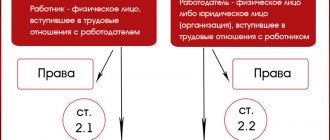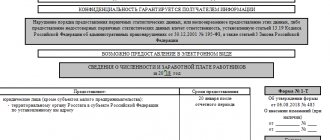Labor relations by their nature invite abuse of rights on the part of the employer, not the employee. After all, the employee is the weak side; he has significantly fewer resources than the organization, both financial and “human”. In this regard, labor legislation initially contained numerous norms that were supposed to help reduce abuse of rights by the employer. At the same time, the Labor Code of the Russian Federation has provided numerous opportunities for employees to abuse their rights. And there will always be unscrupulous employees who use these rights quite consciously and often repeatedly.
Abuse of procedural rights
Abuse of procedural rights by an employee may be interrelated with abuse of material rights. For example, an employee artificially delays the legal process by all formally possible legal means. The reasons for the delay can be both material (reimbursement of a larger amount of wages for forced absence, monetary compensation for wages not paid on time and compensation for moral damage) and personal (“out of spite”, the desire for adverse consequences for the employer - “to fray the nerves” "; delaying the legal process due to the inability to quickly find a new job, fear of losing a job and the necessary experience).
There are many ways to abuse due process. Here are some examples of the most common abuses.
Abuse of rights in labor relations
The court, taking into account the nature and consequences of the abuse committed, denies the person protection of his rights in whole or in part, and also applies other measures provided for by law. In accordance with paragraph.
In the Resolution, the Supreme Court of the Russian Federation mentioned the following examples: So, abuse of law is formally lawful behavior in the form of action or inaction, committed intentionally, with the aim of obtaining positive consequences in one’s favor and negative ones for the employer. However, that's not all.
Abuse of rights by an employee also has some other forms that the personnel employee and manager need to know and remember about.
Dear readers! Our articles talk about typical ways to resolve legal issues, but each case is unique.
If you want to find out how to solve your particular problem, please use the online consultant form on the right or call the numbers provided on the website. It's fast and free!
- Abuse of rights in labor relations by an employee
- Abuse of rights by an employee upon dismissal at the initiative of the employer
- Abuse of rights by an employee
- Are you really human?
- Article: Abuse of rights in labor relations (Yudin A.V.) (“Labor Law”, 2007, n 10)
- Abuse of right
- Abuse of rights in labor relations
WATCH THE VIDEO ON THE TOPIC: About the employment contract and labor relations
Abuse of rights by an employee upon dismissal at the initiative of the employer
Articles for accountants Abuse of rights in labor relations In what cases can we talk about abuse of rights in labor relations? This article analyzes judicial practice on the issue of abuse of rights, both on the part of the employer and on the part of the employee. As judicial practice in labor cases shows, both the employee and the employer can abuse their rights in labor relations by unfairly using the norms of labor legislation. If the fact of abuse of rights by an employee or employer is established, the court may refuse to satisfy the claim. On the one hand, Art. On the other hand, concealment by the employee and failure to provide documents about a valid reason for absence may indicate abuse of the employee’s right. A company employee did not come to work after taking sick leave.
Gritsay Anastasia Pavlovna. Good faith and abuse of rights in labor relations. Gerasimova Elena Sergeevna.
Abuse of rights in labor relations: Arkhipov V. In this work, the author did not set himself the goal of dotting the i’s on the application of the principle of abuse of rights in labor relations, although this has long been necessary for the legislator to do.
Most likely, the reason for studying this problem was that in the law enforcement activities of courts of general jurisdiction, when considering labor disputes, decisions in favor of the employer began to be increasingly encountered, accusing the employee of deliberately misleading the employer’s representatives in order to conceal the employee’s true intentions to cause material damage to the employer. . It is this accusation that I would like to try to deal with by analyzing the employee’s actions in correspondence with the accompanying actions of the employer from the standpoint of the legality and conscientiousness of their behavior in specific controversial situations. As is known, both in theory and in practice of applying labor law, it is customary to unofficially distinguish between the strong employer and the weak employee parties to the employment contract. In practice, the legal consequences of such a division, as a rule, are expressed in the imposition in court proceedings of the obligation on the stronger party to provide evidence of its lawful behavior in a particular labor conflict. And if the abuses of the strong party, which has the so-called master's power, are confirmed by many judicial examples, then a natural question arises:
Are you really human?
Abuse of rights by an employee upon dismissal at the initiative of the employer “Labor Law”, , N 11 In foreign practice, the fact of abuse of rights by an employee is a significant and justified reason for terminating an employment contract at the initiative of the employer.
In Russia, an employer often has to fight in court to prove the legality of his actions.
This article is devoted to some interesting points related to controversial issues of labor relations between the parties in cases of dismissal at the initiative of the employer and will touch upon the concept of “abuse of rights on the part of the employee.”
Of course, the dismissal of an employee is recognized as complying with current legislation only if the employer complies with the grounds and procedure for dismissal established by law and corresponds to the actual circumstances of the termination of the employment relationship between the employee and the employer.
Abuse of rights in labor relations Yudin A.
Zolotukhina O. In the Russian Federation, according to Art. Recognition, observance and protection of human and civil rights and freedoms are the responsibility of the state. The right of everyone to protect their rights and freedoms by all means not prohibited by law is established by Part. These basic constitutional provisions are revealed and supplemented by the basic principles of labor law. These include the principles:
Missing the deadline for filing a claim by an employee
According to Part 1 of Article 392 of the Labor Code of the Russian Federation, an employee has the right to go to court for resolution of an individual labor dispute within three months from the day he learned or should have learned about a violation of his right, and in disputes about dismissal - within one month from the date of delivery him copies of the dismissal order or from the date of issue of the work book.
Paragraph 5 of paragraph 5 of Resolution of the Plenum No. 2 states that circumstances that prevented the employee from filing a lawsuit in a timely manner to resolve an individual labor dispute may be regarded as valid reasons for missing the deadline for going to court, for example: illness of the plaintiff; he is on a business trip; impossibility of going to court due to force majeure; the need to care for seriously ill family members.
Please note that the list of valid reasons is open. In each specific case, the court will decide whether the reason for missing the deadline is valid. Moreover, it is the employee’s responsibility to prove that the missed deadline was justified. At the same time, the employer must do everything possible to convince the court that such reasons were not valid. For example, being busy at work, being on vacation, a business trip, forgetfulness or a mistake in the date cannot be considered valid in any way.
It is also worth paying attention to the fact that often it is the actions (inaction) of employers that are the reason why the period for an employee to go to court is significantly extended over time. As stated above, according to Part 1 of Article 392 of the Labor Code of the Russian Federation, an employee can challenge his dismissal within one month from the date of delivery of a copy of the dismissal order or from the date of issue of the work book. If this was not done, then the employee can go to court six months, a year or even more later. He has this right until the employer fulfills his obligation to serve the dismissal order or hand over the work book to the employee.
Many employers sincerely believe that since they have issued a dismissal order, the employee is fired. However, this is not the case. It is necessary to bring the dismissal order to the attention of the employee, as well as give him a work book and make a payment on the day of dismissal. In practice, situations arise when an employee “disappears”, does not show up for a book, refuses to receive it... But you never know what might come into his head, especially if you have a conflict with him! You, believing that the employee will not return, believe that he has disappeared completely, and do nothing. And after some time, perhaps quite a long time, the employee goes to court with a claim for payment of compensation, for example, for failure to issue a work book, or with another similar claim. And if it is not possible to prove the employee’s abuse of his rights, then the court will satisfy the employee’s demands. Compensation for failure to issue a work book can be quite significant.
Thus, in accordance with paragraph 4 of Article 234 of the Labor Code of the Russian Federation, the employer is obliged to compensate the employee for the earnings he did not receive in all cases of illegal deprivation of his opportunity to work. This obligation also arises if earnings are not received as a result of the employer’s delay in issuing a work book to the employee. If it is proven that the employer committed a violation of labor legislation in the form of a delay in issuing a work book, the average salary for the entire period of forced absence will be collected from him in favor of the employee.
In accordance with paragraph 9 of the Regulations on the specifics of the procedure for calculating average wages, approved by Decree of the Government of the Russian Federation of December 24, 2007 No. 922, the calculation of average earnings when collecting sums of money during forced absence caused by a delay in issuing a work book to a dismissed employee is made by multiplying the average earnings by the number of working days missed due to forced absenteeism.
Let us hasten to reassure employers. The courts generally take the position that the employer’s obligation to compensate the employee for material damage arises only in the event of an unlawful deprivation of the employee’s opportunity to work, including concluding an employment contract, entering into new labor relations (see, for example, the ruling of the Primorsky Regional Court dated 08.06. 2011 No. 33-5143).
In this ruling, the court noted that the employer’s obligation to compensate for material damage caused to an employee by illegal deprivation of the opportunity to work, in the event of a delay by the employer in issuing a work book to the employee, is provided for in paragraph 3 of part 1 of Article 234 of the Labor Code of the Russian Federation. In this case, the employer is obliged to compensate the employee for the earnings he did not receive on the basis of part 1 of this article.
Thus, the obligation to compensate the employee for material damage for the delay in issuing a work book can be assigned to the employer only if these circumstances prevented the employee from starting a new job. However, from the case materials it follows that the employee (plaintiff) left his job with the defendant at the end of April 2009 and was absent from work on the day of dismissal, and also that he was employed in another organization also from the end of April 2009 using a second work book. That is, the plaintiff had the opportunity to work and he took advantage of it, so the court rejected the employee’s claim for compensation for the delay in issuing a work book.
The plaintiff’s comment that the delay in issuing the work book resulted in moral damage to him was also not taken into account by the court, since the absence of grounds for collecting compensation for the delay in issuing the work book also indicates the absence of grounds for collecting compensation for the delay in payments and compensation for moral damage for her delay.
In short, the employee will need to prove that the failure to issue a work book led to direct actual damage to him. The employee’s damage is expressed in lost wages, which he could have received if his opportunity to find a job with another employer had not been limited by the lack of a work book. Moreover, the employee needs to provide evidence of the difficulties that have arisen - name specific organizations that refused to hire him due to the lack of a work book.
What advice should you give to an employer in such situations? Perhaps a trivial thing: thoroughly follow the procedure for notifying an employee (Part 6, Article 84.1 of the Labor Code of the Russian Federation). If possible, it is best to do this in person. If an employee refuses to receive a work book or read the dismissal order, the employer should draw up a report about this. If it is impossible to hand over the work book in person on the day of dismissal, then the employee should be notified of the need to appear for the work book or agree to have it sent by mail. From the date of sending such notification, the employer is released from liability for the delay in issuing the work book. You can send the notice by courier, but do not forget that the employee must sign for its receipt. If this cannot be done, then you need to send a notification to the former employee’s address by registered mail with a list of the attachments.
Positions on the prohibition of abuse of rights and dominant position in the market (Clause 1 of Article 10 of the Civil Code of the Russian Federation)
1.1. What is meant by abuse of right 1.1.1. Abuse of rights occurs when a subject acts contrary to the norm that grants him the corresponding right, does not correlate behavior with the interests of society and the state, and does not fulfill a legal obligation corresponding to this right (position of the RF Armed Forces) 1.1.2. Abuse of rights is understood as a situation when a person acts within the limits of the rights granted to him, but in an unauthorized way (position of the RF Armed Forces) 1.2. To what situations does paragraph 1 of Art. 10 Civil Code of the Russian Federation 1.2.1. General situations qualified as abuse of right 1.2.1.1. Concluding a transaction aimed at violating the rights and legitimate interests of creditors is an abuse of law (position of the Supreme Arbitration Court of the Russian Federation) 1.2.1.2. Depositing money into a notary's deposit is an abuse of right on the part of the debtor if there is no evidence of the creditor's evasion from accepting the performance (position of the Supreme Arbitration Court of the Russian Federation) 1.2.2. Abuses during purchase and sale 1.2.2.1. Alienation of property necessary for the seller to fulfill statutory tasks, and his expenses for renting this property, which are many times higher than the sale price, indicate abuse of rights on the part of the buyer (position of the Supreme Arbitration Court of the Russian Federation) 1.2.2.2. The application of the purchaser of real estate to evict the tenant due to the lack of state registration of the lease agreement, the existence of which the applicant knew at the time of acquisition, is an abuse of right (position of the Supreme Arbitration Court of the Russian Federation) 1.2.2.3. The performance by auction participants of actions aimed at creating the appearance of competition at the auction in order to cut off potential offers from bona fide participants may indicate an abuse of right (position of the Supreme Arbitration Court of the Russian Federation) 1.2.3. Abuses during rental 1.2.3.1. The creation by the tenant, when executing the contract, of conditions of obvious disproportion to the property status of the parties is an abuse of law (position of the Supreme Arbitration Court of the Russian Federation) 1.2.3.2. Re-letting, the purpose of which is to avoid contractual liability (other adverse consequences) or provide unreasonable advantages to a new tenant, is qualified as an abuse of right (position of the Supreme Arbitration Court of the Russian Federation) 1.2.4. Abuses in contracting 1.2.4.1. The requirement to recognize a work contract as not concluded is an abuse of law if the customer has not provided performance under the contract and the statute of limitations for collecting debt from him has expired (position of the Supreme Arbitration Court of the Russian Federation) 1.2.5. Abuses in insurance 1.2.5.1. The insurer's reference to the non-compliance of the insurance contract with the law is an abuse of law if the contract was concluded on the terms proposed by the insurer (position of the Supreme Arbitration Court of the Russian Federation) 1.2.5.2. The insurer's requirement to present a document that obviously cannot be presented to the victim for objective reasons may constitute an abuse of right (position of the RF Armed Forces) 1.2.6. Abuses during transportation 1.2.6.1. Presentation of a claim to the carrier based on the declared value of the cargo may constitute an abuse of right if this value clearly does not correspond to the actual value (position of the Supreme Arbitration Court of the Russian Federation) 1.2.7. Abuses in relations involving banks 1.2.7.1. The imposition by a large bank of unreasonable restrictions on a counterparty-entrepreneur or the establishment of unreasonable conditions for the exercise of rights may be recognized as an abuse of right (position of the Supreme Arbitration Court of the Russian Federation) 1.2.7.2. The establishment in a loan agreement of unreasonably inflated interest rates in case of late payment is an abuse of law if the bank's losses are fully covered based on the regular interest rate (position of the Supreme Arbitration Court of the Russian Federation) 1.2.7.3. The collection of a bank commission when paying a tax fee indicates actions outside the scope of the exercise of civil rights (position of the Supreme Arbitration Court of the Russian Federation) 1.2.7.4. If the improper execution of the agreement is caused by dishonest actions of the borrower who has not repaid the loan, then his demand to recognize the transaction as invalid due to a defect in form is an abuse of law (position of the Supreme Arbitration Court of the Russian Federation) 1.2.7.5. The beneficiary's demand for payment under the guarantee in the case when the main obligation is properly fulfilled is regarded as an abuse of right (position of the RF Armed Forces, the Supreme Arbitration Court of the Russian Federation) 1.2.8. General cases of abuse in bankruptcy 1.2.8.1. The creditor's requirement to present the same documents, or documents that have no value for control, or confidential information is an abuse of law (position of the Supreme Arbitration Court of the Russian Federation) 1.2.8.2. If the debtor commits actions aimed at concealing property or its illegal transfer to third parties, or provides knowingly false information, this indicates evasion of debt repayment and may be recognized as an abuse of right (position of the RF Armed Forces, the Supreme Arbitration Court of the Russian Federation) 1.2.8.3. If an individual tries to terminate debt obligations that arose before receiving the status of an individual entrepreneur through the bankruptcy procedure of an individual entrepreneur, this is an abuse of law (position of the RF Armed Forces) 1.2.9. Abuses during bankruptcy of a citizen 1.2.9.1. The debtor's objection to the claim of the bankruptcy creditor or an authorized body, obviously aimed at delaying the introduction of the bankruptcy procedure, can be qualified as an abuse of right and rejected (position of the RF Armed Forces) 1.2.9.2. If the debtor abuses the right and does not agree to pay for the services of third parties, whose involvement is necessary to ensure the activities of the financial manager, the court has the right to allow the latter to attract these persons and pay for their services at the expense of the bankruptcy estate, provided that it is sufficient (position of the RF Supreme Court) 1.2.9.3 . If it is proven that the debtor’s disagreement with the debt restructuring plan is an abuse of law, the court has the right to approve this plan without the debtor’s approval (position of the RF Armed Forces) 1.2.9.4. The arbitration court does not approve a debt restructuring plan if it is obviously economically unfeasible, does not provide that the debtor and his dependent family members will be left with funds for living, or the implementation of the plan will significantly violate the rights and legitimate interests of minors (position of the RF Armed Forces) 1.2.10 . Abuses in corporate relations 1.2.10.1. Unfair behavior of a shareholder aimed at receiving funds on an equal basis with the claims of other creditors at the expense of the debtor’s property is an abuse of right (position of the Supreme Arbitration Court of the Russian Federation) 1.2.10.2. The requirement of a company participant to provide information is recognized as an abuse of right if he is a competitor of the company, and the dissemination of information may cause harm to commercial interests (position of the Supreme Arbitration Court of the Russian Federation) 1.2.10.3. Making a demand to invalidate a decision of the board of directors of a company made in violation of the charter is recognized as an abuse of right if the violation is caused by dishonest actions of the plaintiff himself (position of the Supreme Arbitration Court of the Russian Federation) 1.2.10.4. Repeated submission by a shareholder of a demand to convene an extraordinary general meeting on the same issue with the aim of causing harm to society is recognized as an abuse of right (position of the Supreme Arbitration Court of the Russian Federation) 1.2.10.5. The definition in the company's charter of settlements located outside the Russian Federation as venues for general meetings may be qualified as an abuse of right (position of the Supreme Arbitration Court of the Russian Federation) 1.2.10.6. Donation of a share by participant A to a third party after participant B filed a claim for the exclusion of participant A from the LLC and a verdict was passed against him for damage caused to the property of the company may indicate abuse of the right by participant A (position of the Supreme Arbitration Court of the Russian Federation) 1.2.10.7 . Challenging a guarantee agreement by the controlling shareholder of the guarantor in the event of the insolvency of the main debtor, controlled by the same person, is an abuse of law if the creditor under the main agreement has properly fulfilled his obligations, and the main agreement is not disputed (position of the RF Armed Forces) 1.2.11. Abuse by the owner of state (municipal) property 1.2.11.1. The demand of the founder of a municipal budgetary institution to terminate the lease agreement and evict the institution from the occupied premises is an abuse of right (position of the Supreme Arbitration Court of the Russian Federation) 1.2.11.2. Assigning the entire building to the institution with the right of operational management, in order to prevent the exercise of the right to buy out the premises, may be considered an abuse of right (position of the Supreme Arbitration Court of the Russian Federation) 1.2.11.3. Actions to delay the liquidation of an institution, aimed at evading settlements with creditors and releasing from subsidiary liability, in the absence of objective reasons, are an abuse of law (position of the Supreme Arbitration Court of the Russian Federation) 1.2.12. Abuse in the field of intellectual rights 1.2.12.1. The actions of a person to acquire the exclusive right to a trademark are recognized as abuse of rights if this person impersonates the former copyright holder of the identical mark in order to gain competitive advantages, and the registration of the mark misleads consumers (position of the Supreme Arbitration Court of the Russian Federation) 1.2.13. Abuses when going to court 1.2.13.1. Filing a claim to register the transfer of ownership of real estate as arising from an agreement with a person declared bankrupt and excluded from the Unified State Register of Legal Entities is an abuse of right (position of the Supreme Arbitration Court of the Russian Federation) 1.2.13.2. Going to court to obtain a decision on the obligation to conclude a lease agreement for property already pledged by the debtor is an abuse of right (position of the Supreme Arbitration Court of the Russian Federation) 1.2.13.3. Filing a claim for collection of a debt calculated on the basis of a normative act, which was declared illegal by a decision of the same court in another case, is an abuse of law (position of the Supreme Arbitration Court of the Russian Federation) 1.2.13.4. The requirement to collect a penalty in that part of it that is clearly excessive may be qualified by the court as an abuse of law (position of the Supreme Arbitration Court of the Russian Federation) 1.2.13.5. The requirement to collect a penalty as a way to secure an obligation in which the plaintiff has actually lost interest is an abuse of law (position of the RF Armed Forces) 1.2.13.6. The borrower's demand to invalidate the loan agreement may indicate an abuse of right if such a demand is made after filing a claim for debt collection under this agreement, and the actions of the borrower gave the lender grounds to rely on the validity of the transaction (position of the RF Armed Forces) 1.2.14. Abuses when contacting government agencies and local governments 1.2.14.1. A citizen’s unfounded appeal to government agencies and local governments with the intention of causing harm to another person is an abuse of law (position of the Constitutional Court of the Russian Federation, the Armed Forces of the Russian Federation) 1.2.14.2. The use of offensive expressions in appeals to government bodies is an abuse of law (position of the RF Armed Forces) 1.2.15. Abuses in housing relations 1.2.15.1. Retention by a citizen who has terminated a social tenancy agreement of registration in an apartment is an abuse of right if he does not live in it for a long time, left voluntarily, or stopped fulfilling his obligations under the agreement (position of the RF Armed Forces) 1.2.15.2. The conclusion by a parent of a transaction for the alienation of residential premises in order to infringe on the rights of children may indicate a discrepancy between the transaction and the fundamentals of law and order and morality and an abuse of law (position of the RF Armed Forces) 1.2.16. Abuses in relations involving citizen-consumers 1.2.16.1. Termination by a monopoly organization of energy supply to debtor organizations, which led to a violation of the rights of bona fide citizen-consumers, can be regarded as an abuse of right (position of the RF Armed Forces) 1.2.17. Abuses in energy supply relations 1.2.17.1. A requirement to pay for services provided using additional power grid facilities acquired during the period of tariff regulation may be qualified as an abuse of law if this requirement is aimed solely at circumventing the legal norms of state price regulation and disturbing the balance of interests of network organizations and service consumers (position RF Armed Forces) 1.2.18. Abuses in criminal proceedings 1.2.18.1. An appeal by a private prosecutor to the court with a statement to initiate a criminal case against a specific person is an abuse of law if such a statement has no grounds and is due only to the intention to cause harm to another person (position of the Constitutional Court of the Russian Federation, the Supreme Court of the Russian Federation) 1.3. To what situations does paragraph 1 of Art. 10 Civil Code of the Russian Federation 1.3.1. The rule prohibiting abuse of rights does not apply to the powers of the state executive body (position of the Supreme Arbitration Court of the Russian Federation) 1.3.2. Understating the value of property during sale does not in itself indicate an abuse of right (position of the Supreme Arbitration Court of the Russian Federation) 1.3.3. Understatement of the price of contracts and the subsequently revealed unprofitability of concluded transactions do not in themselves indicate abuse of rights (position of the Supreme Arbitration Court of the Russian Federation) 1.3.4. The legal refusal of a former family member of the tenant to consent to the privatization of the residential premises he occupies cannot be considered an abuse of right (position of the RF Armed Forces) 1.3.5. The performance by the administration of a commercial seaport of the functions assigned to it is not an abuse of law (position of the Supreme Arbitration Court of the Russian Federation) 1.3.6. Refusal to satisfy a vindication claim with reference to the rule on abuse of right is not allowed if it is established that the plaintiff has ownership rights (position of the Supreme Arbitration Court of the Russian Federation) 1.3.7. An undervaluation of the price of an investment agreement compared to the market value of real estate does not in itself indicate an abuse of right on the part of the citizen-buyer (position of the RF Armed Forces) 1.3.8. Actions of the copyright holder to protect the exclusive right to a trademark are not an abuse of right if they are committed before a third party applies to the court with a demand for early termination of the legal protection of this trademark (position of the RF Armed Forces) 1.4. What circumstances need to be proven if a dispute arises under paragraph 1 of Art. 10 Civil Code of the Russian Federation 1.4.1. Abuse of rights can only occur if a person has the appropriate right (position of the Supreme Arbitration Court of the Russian Federation) 1.4.2. To qualify actions (inaction) as abuse of a dominant position, the presence (threat of occurrence) of any of the consequences listed in the legislation is sufficient (position of the RF Armed Forces, the Supreme Arbitration Court of the Russian Federation) 1.5. What evidence can be used if a dispute arises under paragraph 1 of Art. 10 Civil Code of the Russian Federation 1.5.1. The fact that the amount of penalties presented for collection exceeds the amount of the principal debt does not confirm the abuse of rights on the part of the plaintiff (position of the RF Armed Forces) 1.6. How other rules of law apply to legal relations regulated by paragraph 1 of Art. 10 Civil Code of the Russian Federation 1.6.1. The court may refuse to approve a settlement agreement that violates corporate law only in case of obvious abuse of law, when the transaction is void (position of the Supreme Arbitration Court of the Russian Federation)
Delaying the process
During the trial, the employer's representative should closely monitor its progress and promptly raise objections regarding the request for evidence that is not related to the subject of the dispute and the filing of motions.
A big disadvantage of labor legislation is the absence of any responsibility for the employee when revealing facts of abuse of rights. However, Article 99 of the Code of Civil Procedure of the Russian Federation establishes that from a party that has filed an unfounded claim or dispute regarding a claim in bad faith, or has systematically opposed the correct and timely consideration and resolution of the case, the court may recover compensation in favor of the other party for the actual loss of time. The amount of compensation will be determined by the court within reasonable limits and taking into account the specific circumstances. Therefore, if an employer observes that an employee is deliberately delaying the legal process, it makes sense to try to prove this in court by demanding compensation from the employee.
Earn money
- Download and simplify your work
To begin with, it is necessary to determine the theoretical meaning of the concepts “abuse of law” and “fair delusion”.
The author has not found any legal definitions of these concepts in any branch of Russian legislation; in general, these phenomena can be determined based on the content of paragraph 1 of Art. 10 of the Civil Code of the Russian Federation, which states that actions of citizens and legal entities carried out solely with the intention of causing harm to another person, as well as abuse of rights in other forms, are not allowed.
The author has derived the following definitions of the concepts under consideration. Conscientious error is the presence of an erroneous opinion about the essence of any phenomenon or fact when fulfilling duties in good faith and exercising rights.
Abuse of right, for example, in the Dictionary of Economic Terms the following definition is given: the use of subjective right in contradiction with its social purpose, entailing a violation of legally protected public and state interests or the interests of another person.
In the Big Legal Dictionary: a type of civil offense consisting of exceeding the limits of the exercise of one’s powers permitted by civil law by exercising them for an illegal purpose or by illegal means, violating the rights and legitimate interests of other persons. It is explained that on the basis of clause 2 of Art.
10 of the Civil Code of the Russian Federation, when this fact is confirmed in a trial, the following legal consequence occurs - the ability of the court, at its discretion, to refuse to protect the relevant right to the person who has abused it.
Moreover, in the science of civil law, abuse of right is considered as a special type of civil offense committed by an authorized person in the exercise of his right, associated with the use of prohibited specific forms within the framework of the permitted general type of conduct2.
In addition, in the theory of Russian civil law there is a differentiation of forms (types) of abuse of law:
chicane3. Reflected in paragraph 1 of Art. 10 of the Civil Code of the Russian Federation in the form of the following rule: actions of citizens and legal entities carried out solely with the intention of causing harm to another person; other forms of abuse of right are not allowed. They differ from chicanes in that actions are performed without the intention of causing harm to another person, but objectively cause it.
Abuse of rights is an unlawful act expressed in forms of behavior prohibited by law, but within the limits of the general type of behavior permitted by law, causing, voluntarily or involuntarily, harm to any subject of social relations.
Moreover, according to V.P.
Gribanov, behavior that not only violates specific rules of law, but also contradicts the legal principles of a given system, branch or institution of law, should be considered illegal, even if this behavior does not contradict a specific rule of law4.
The author believes that, no matter in what form the abuse of law manifests itself, the legal consequences should be the same - denial of judicial protection of the rights belonging to a person, which he intended to exercise in a situation convenient for him.
At the same time, the subjective side of abuse can be expressed both in the form of indirect intent or negligence, and in the intentional abuse of a person’s rights.
It should be noted that the principle of inadmissibility of abuse of rights can be characterized as a subtype of the presumption of good faith of participants in public relations.
In practice, the actions of participants in labor relations are rarely recognized as abuse of rights.
This approach seems correct to the author, since the application of this principle in the absence of a legal norm in the Labor Code of the Russian Federation that would indicate the signs of a prohibited act, i.e.
clear criteria that a court should follow when refusing to protect a person’s rights may lead to a violation of the principle of legality when making court decisions.
According to A. A. Malinovsky, unlawful abuse of law differs from an offense in that the subject in this case commits an unlawful act through the exercise of his subjective right (authority) and its initial stage is within the framework of the law5.
Civil law, for example, is sufficiently developed for application, however, it does not have a clear understanding of the boundary separating the stage of abuse of law from the period of offense or the phase of honest mistake.
Uncertainty on these issues may give rise to an unreasonably broad interpretation of the concept or lead to refusal to apply it.
However, the application of the principle of abuse of rights in the absence of its official criteria in labor law can lead to an arbitrary violation of the constitutional principle of the right to judicial protection of violated rights.
The line between conscientious misconception about the limits of the rights granted to the subject and the methods for their implementation and abuse of rights is very thin. To avoid mistakes, legislation must contain clear principles for distinguishing these concepts.
At the same time, the Constitution of the Russian Federation does not literally, but reflects the basis for applying the principle of inadmissibility of abuse of law. So, according to Part 3 of Art.
17 the exercise of human and civil rights and freedoms must not violate the rights and freedoms of other citizens.
Characteristic signs of abuse of rights are:
the use by an authorized person of a subjective right in contradiction with its social purpose; exceeding the limits permitted by positive (written) law in the exercise of their powers; the exercise of powers for an illegal purpose, in unauthorized forms or by illegal means; violation of legally protected public, state and private interests, expressed in ignoring legal rights and interests of other persons; committing violations within the framework of a permitted general type of behavior; committing actions with or without the sole intention of causing harm, but objectively causing harm to another person.
It follows that the abuser must have the rights to perform appropriate lawful actions, but he uses these rights in a way that causes harm to some person.
In this case, we are not talking about failure to fulfill any obligations assigned to the person abusing his rights, which would have a different legal nature and other legal consequences, expressed in legal liability for violation of obligations.
K. filed a lawsuit against the national joint-stock bank "Far North" for the recovery of monetary remuneration, cancellation of the disciplinary sanction, compensation for moral damage, collection of bank interest for the illegal use of other people's funds, and reimbursement of expenses for paying for the assistance of a representative6.
Source: https://jobmoney.ru/233-zloupotreblenie-pravom-rabotnikom/
EXAMPLE No. 1
A company employee did not come to work after taking sick leave. In her opinion, the employer must pay her a certain amount of wages, which consisted of an official and an unofficial part.
No written notice of suspension of work was sent to the employer. The employer did not agree with the specified debt and fired the employee for absenteeism.
The employee filed a lawsuit for reinstatement at work.
The court rejected the employee's claim on the following grounds.
From the meaning of Article 142 of the Labor Code of the Russian Federation, as well as due to the explanations set out in paragraph 57 of the Resolution of the Plenum of the Armed Forces of the Russian Federation dated March 17, 2004 No. 2, it follows that the employee has the right to suspend work, provided that the delay in payment of wages amounted to more than 15 days and the employee notified the employer in writing of the suspension of work.
HR SERVICES
Features of the application of judicial practice
A review of judicial practice suggests that until recently, processes involving the application of rules on abuse of civil law were practically not used in the same way as cases of arbitrariness. But due to the fact that the number of conflicts arising on this basis has increased significantly recently, the number of court decisions has also increased, where the motivation contains conclusions about neglect or abuse of rights by the defendant.
Such cases are quite controversial, since civil law does not contain a detailed description of the rules of abuse. Decisions on the presence or absence of abuse are made only at the discretion of the judge.
Judicial arbitration practice applies, as a consequence of such violations, not only refusal of protection, but also recognition of the concluded contract as invalid.
Advice: creditors should resort to this practice if they see that as a result of transactions concluded by the debtor, including the alienation of property, their interests are affected and violated.








